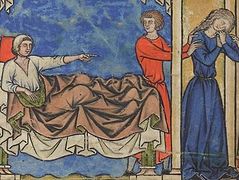This view of the Church as a spiritual hospital leads us to a firm position regarding the Church and regarding everything Christ told us, because He spoke as a doctor, and not in ethical categories. He didn’t speak in ethical, philosophical, or ideological categories. He spoke in purely medical terms and gave man a medical prescription on the basis of which man could restore his spiritual health and move on to theosis. Therefore, righteousness is what’s missing in us.
Blessed are they which are persecuted for righteousness’ sake. Blessed are the persecuted, but not because of some righteousness of this world, because we should know that righteousness will never rule in this world—that’s a utopia, and it’ll never happen, even if all of us living on earth now, all seven billion of us, decide to sign a contract that we’ll become very good people and eliminate any form of unrighteousness. It may sound utopian, but we can do it. However, the youth who are born after us will freely choose evil and unrighteousness, which often comes not from malice but because everything is complicated—so complicated that a man can’t find the root of evil.
Righteousness is a spiritual concept. Those persecuted for righteousness are people who struggle in this life to acquire the grace of the Holy Spirit, and as long as they struggle, they will suffer persecution. It doesn’t always mean there is someone harassing us—although in our days there were and are such brethren. The majority of the Orthodox Churches were not so long ago subject to persecution and even cruel tortures. There are great martyrs worthy of admiration in Eastern European countries. Thousands of martyrs. But let’s say we don’t have this type of martyrdom now. In the past in our country, when the Turks or Latins were in our lands, we had problems, tortures, persecutions, oppression. Now we’re free. Does this mean that Christ’s blessedness has lost its power for us? No. This isn’t related to external persecution. When a man labors and fights against his passions, he lives mourning—and that’s a fact. This is the putting off of the old man, and when we say “putting off,” we mean exactly what the Apostle writes: Put off the old man (Col. 3:9). It means I remove absolutely everything from myself. And the putting off of the passions, the putting off of the old man isn’t easy, but a very difficult work, like you’re ripping off your own skin; and sometimes it’s so hard to do, that a man does it with tears and great sorrow.
Literally, the word “grieving” means I’m morally falling apart. A man with real sorrow must pass through this stage in order to put off the old man. The Holy Fathers give an example with a snake: When a snake sheds its old skin, it passes through a very narrow opening between rocks, which nearly flattens it. And it does this just to get rid of its old skin and just have the new skin. It’s a demand of its nature. Similarly, a man grieves and is sad, forcing himself to go this narrow path and put off from himself the old man. In this sense, Christ says that He is the Way leading to the Kingdom of God, the narrow and grievous Way. It doesn’t mean the Lord wants us to be tortured or become masochists who love to suffer. We have nothing to do with that. We love our self, we respect it, we care for it, but the passions are something we don’t want to have.
In the Patericon there’s a story about Abba Poemen who did something that seemed to the Egyptian hermits of that time to be providing for his comfort. Today it wouldn’t be a called a great luxury. What did he do? He washed his feet. And someone came to him and said:
“Abba Poemen, you’re an ascetic. Why’d you do that? You washed your feet! What’s that about? This is unacceptable!”
Abba Poemen answered him kindly:
“We are murderers not of our bodies, but our passions!”
We don’t kill our bodies. The Church doesn’t kill the human body, but the passions; and in killing the passions, it sanctifies the body. The body is sanctified and again acquires its true value. The body is glorified in the Church. Only the Orthodox Church glorifies the body of the saints. What are holy relics? They are proof of the glorification of the bodies of the saints, because their bodies become deified; not just their souls, but also their bodies—every body part, without exception. It doesn’t happen that some parts of the body were sanctified and others sinful. The whole man becomes holy, sanctified, deified, and becomes a member of Christ and a temple of the Holy Spirit. When man dies and his soul is separated from the body, it’s the body that remains the temple of the Holy Spirit. Therefore, we accept holy relics, we prostrate before them, we venerate them, and they work miracles. That’s why myrrh flows from the relics of saints, and they’re fragrant, they work miracles, they heal passions, and so on. The Church sanctifies the whole man, sanctifies the human body, sanctifies nature, creation, and all being.
He doesn’t heal just one part of the body, one physical member, but strikes the passions and knows how to separate the natural from the unnatural, from what he took on with the Fall. Thus, in this healing process, given us by Christ, the Apostles, and the saints, healing takes place. Outwardly it seems difficult, especially at first it’s perceived as a very difficult process. But it’s not so—it just seems to us like a difficult process. Although the path to salvation is narrow and sorrowful, says Christ, the path to perdition is wide.
Unfortunately, after the Fall our nature fell ill with carnality, because man redirected his desire from God to creation, trampling upon God’s commandment. Carnality entered our nature, and the antidote to it is diligence; that is, labor and struggle. This is the secret of the spiritual life. At first, the spiritual life seems like slavery, something difficult, oppressive, and it leads to phenomena that upset us. For example, you find yourself in a certain situation, and you force yourself to preserve your conscience, to not trample upon it, and therefore you become an object of ridicule, mockery, and a thousand other unpleasant things can be done to you by those around you. This is definitely sorrowful and difficult for you. You try to preserve your conscience and refuse to submit to the passions. This is a very, very, very difficult work. Passions aren’t just carnal. There are various passions that strangle us, and every age has its own passions—these various types of grief. But when someone resists them, then his soul, no matter how paradoxically, feels freedom—the enormous freedom that is born from this war with the passions. When a man tastes this freedom, when he understands what it means to be free and breathes this Divine oxygen, then he comprehends what previously seemed incomprehensible to him.
Therefore, when someone wants to enter the Church, we shouldn’t start with what a Christian should be, with what he should avoid, that is, we shouldn’t tell him:
“If you want to become a Christian, then you should start praying, fasting, going to church, having no carnal relations, and not do this or that…”
That way, you will, of course, immediately kill his desire to become a Christian. He’ll be seized by horror, he won’t be able to stand it, he’ll leave the church and he’ll say:
“What’s that about? Who can do all that? Can people really not have, or reject sexual relations nowadays?!”
Sexual relations are like a deity today, the biggest deity in the world. Wherever you look, you see it everywhere; you see it on the billboards where it’s advertised. It’s on everything you can imagine: on car tires, on pasta packaging, on soap, on toilet paper, on spaceships, on planes, in tourist booklets. That’s how this deity is advertised. What do car tires have to do with sexual relations? Simply unbelievable combinations! Unfortunately, this is how this deity is advertised in our days, even here, in Cyprus, and in Greece. I don’t know how things are with this deity in Europe, but I’ve heard that it’s very much in demand there. There’s an almost complete lack of control over showing sexual and obscene content on TV and in films there. It’s a terrible thing, it’s like a firestorm. Who can be saved from this? As it says in the Gospel: Who then can be saved? (Lk. 18:26). And indeed, who can be saved?
Imagine you have children, twelve, thirteen, and fifteen years old, and they see such things on TV. Their imagination is kindled and sin begins to shine like apples that are rubbed to shine before being sold, so buyers would think the apples are very sweet—although they should be thrown away. Sin creeps into a man when it’s advertised in the media. I’ve never seen such a thing, or rather, I’ve seen it only once—on Mt. Athos. When did I see such a thing on Mt. Athos? I didn’t see this even when I was a student. So, on Mt. Athos, I was the guest master, responsible for putting pilgrims in cells.
One foreigner, of course, with the best of intentions, left a magazine with obscene content open under his pillow. He left it and left. We went to clean the cell where he had stayed. When we lifted the sheets and pillows, we found this magazine; or rather, I found it. For five minutes I didn’t understand what it was; I looked at it and didn’t understand. I couldn’t understand what I was seeing in this magazine. And when I realized it, I said to myself:
“Just look at what’s going on! This pilgrim came to Mt. Athos, to the monastery, and brought such a magazine with him. He can’t even go a day without looking at a dirty magazine. Then he goes to confess this sin.”
Fortunately, the Lord saved me from this temptation and I was never tempted to look at such magazines. Then I said to myself:
“Imagine what happens to the soul of a man who looks at such magazines!”
My children, this is something terrible!
I don’t know if you understand what I’m telling you, but at least you have the opportunity to hear my talk, to listen to me, a hapless one. After all, I’m not an ordinary “phenomenon” because I stand behind people, and can tell you something that is an unusual phenomenon today.
Unfortunately, I have one disadvantage: I have questioned people in confession. To be more precise—I’ve asked people who were coming to confession for the first time in their lives about their sins and they’ve said to me:
“Despota, ask us! Ask us about our sins so you can help us confess properly!”
Well, what can you ask someone about in confession? It’s not such an easy thing to ask a man about his sins. Someone could say:
“Just look at him! And what’s he thinking about!”
You should ask, but not bluntly, but with leading questions. Yes, don’t laugh, because one day a simple, elderly woman came to me for confession, and she said to me:
“Father, ask me, ask me about my transgressions!”
So I asked her:
“Have you had any love relationships with other men besides your husband?”
“What?!” The woman was indignant and very nearly punched me. “How dare you ask that? How could you think I’m capable of committing such a sin?!”
One time I asked someone in confession:
“Have you had a love relationship with another person?”
“With a man? No,” he said. “Only with women!”
And I asked him further:
“Are you careful?”
“Yes, I’m careful.”
Sometime later, this man came to me for confession again, and I asked him the same question:
“Are you careful?”
“Of course, I’m careful.”
That is, he took precautions so his partner wouldn’t conceive a child! He had intimate relations with a girl, and they made sure she didn’t get pregnant. But I meant something completely different when I asked this question: that they shouldn’t have premarital relations, and so on. Words have acquired a different meaning today. I asked someone else the same question:
“Are you careful?”
“Of course! We take all precautions and we’re very attentive!”
Why is this happening? Because, my children, the criteria are already blunted. Here’s a small child, but there’s already something different in him, because he survived an attack on his soul and it changed him psychologically. And naturally, the relationship with the surrounding world then also changes.
Let’s get back to where we started. As an antidote to carnality, our nature is given work. But does it really not impress upon you that Christ is calling you to draw nearer to Him, that He wants to draw you to Himself, so that you become His followers? And it’s wonderful that the Gospel, the word of God, is what attracts us. We say that Church preaching should draw people. Nevertheless, we see that Christ and the Church attract us, promising this: “Blessed are you when you are persecuted for your spiritual life; when you live through this sorrow, these hardships, all this labor—then you are blessed.” How will you find followers if you promise them tribulation?






